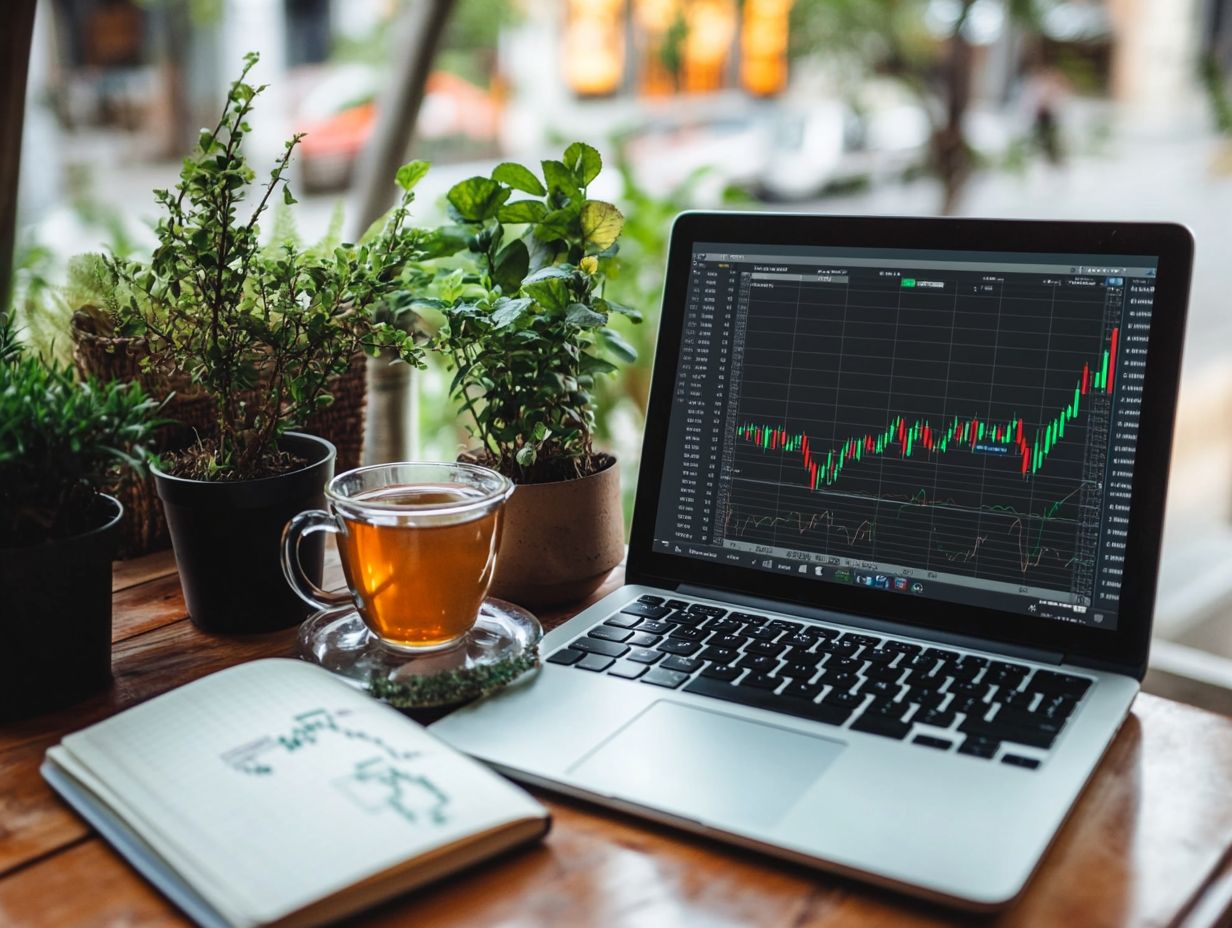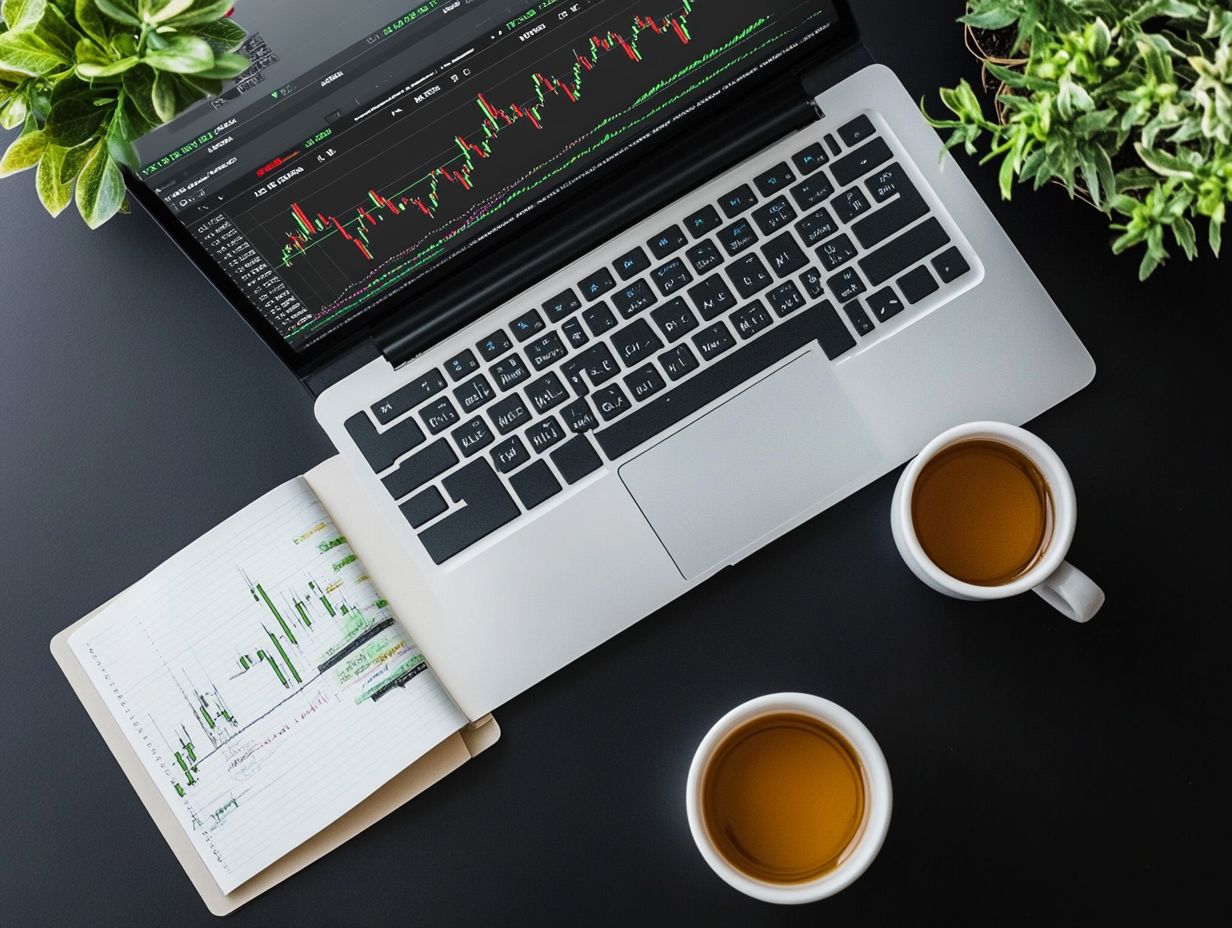The Connection Between Mental Health and Trading
Mental health is pivotal to your trading success. It deeply influences your decision-making and overall performance.
As a trader, you encounter unique stressors that can lead to mental health challenges, impacting your ability to navigate the markets with clarity and confidence.
This article delves into the intricate relationship between mental well-being and trading. It highlights the common challenges you may face and offers practical strategies to support your mental health.
From effective self-care techniques to cultivating a supportive environment, you will find guidance on how to foster resilience as you trade.
Contents
- Key Takeaways:
- Understanding Mental Health’s Impact on Trading
- The Impact of Mental Health on Trading Performance
- Strategies for Maintaining Mental Health While Trading
- Creating a Supportive Trading Environment
- Frequently Asked Questions
- What is the connection between mental health and trading?
- How does mental health affect trading performance?
- What are some common mental health challenges faced by traders?
- Can mental health issues be a barrier to success in trading?
- How can traders prioritize their mental health while trading?
- Are there any resources available for traders struggling with mental health issues?
Key Takeaways:

- Mental health plays a crucial role in trading performance and decision making. Traders must understand and prioritize their mental well-being to succeed in the market.
- Common mental health challenges, such as anxiety and impulsiveness, can negatively impact trading. Developing strategies to manage these challenges is essential for long-term success.
- Self-care techniques, seeking professional help, and creating a supportive trading environment are all vital for maintaining good mental health while trading. A balance of these strategies can lead to better decision making and overall performance.
Understanding Mental Health’s Impact on Trading
Your mental health is key when trading. Research from institutions like Ball State University underscores the importance of personal stressors, emotional experiences, and mental resilience in successfully navigating the complexities of the stock market, especially during downturns and periods of investment losses.
By grasping the connection between trading and emotional health, you can enhance your financial strategy and develop more effective ways to handle stress to manage the inherent pressures of the trading landscape.
The Impact of Mental Health on Trading Performance
The impact of mental health on your trading performance is significant. To thrive in the market, you must navigate the delicate balance of emotional regulation and mental preparedness, as highlighted in understanding the importance of self-care for traders, to make sound trading decisions.
Impulsive choices driven by stress or anxiety can lead to considerable financial setbacks and risk management failures, complicating your trading career.
Cultivating mental resilience is crucial for maintaining focus and discipline, particularly during periods of market volatility and uncertainty that can influence stock ownership and portfolio risks.
How Mental Health Can Affect Trading Decisions
Mental health can profoundly influence your trading decisions. Your emotional stability often dictates the behavioral patterns you exhibit as a trader.
When you’re grappling with anxiety or depression, your cognitive edge may wane, leading to poor trading strategies and unfavorable outcomes.
Mastering trader psychology involves cultivating self-discipline and emotional regulation, ensuring that your decisions remain unaffected by fleeting emotional states.
You might find yourself making impulsive trades or clinging to losing positions longer than you should, often driven by fear or hope rather than a solid strategy.
Imagine being so overwhelmed by stress that you enter positions without proper research, relying solely on gut feelings instead of data-driven analysis.
On the flip side, positive emotions can also lead to overconfidence, pushing you toward reckless risk-taking that ignores your established limits. Ultimately, the intricate relationship between mental health and trading performance highlights the importance of building resilience and maintaining a balanced mindset.
Poor emotional regulation not only jeopardizes your individual portfolio but can also undermine the integrity of the entire market.
Common Mental Health Challenges for Traders

Common mental health challenges for traders often arise from the stressors tied to financial losses and the emotional rollercoaster of market volatility and uncertainty. These pressures can increase anxiety and depression. They may even lead to physical issues like peptic ulcers and abdominal pain, affecting your overall well-being.
Accessing professional support and adopting effective coping mechanisms can help you navigate these challenges. This fosters a healthier trading environment.
The relentless pressure to perform in a fast-paced setting can amplify feelings of inadequacy and self-doubt, hindering your decision-making abilities and leading to impulsive trades. Emotional experiences, such as the fear of missing out (FOMO) or regret, can further cloud your judgment, making it difficult to stick to a well-thought-out strategy.
By cultivating resilience through mindfulness practices and building a strong support network, you can equip yourself with essential tools to cope effectively. This highlights the importance of mental health for achieving consistent trading success. Recognizing when to seek professional help can be a pivotal step toward maintaining your emotional balance and enhancing your performance.
Strategies for Maintaining Mental Health While Trading
Maintaining mental health while trading is essential for your long-term success. Implementing effective strategies fosters emotional stability and mental resilience.
Embracing self-care techniques, such as regular exercise, mindfulness practices, and ensuring adequate rest, can enhance your mental clarity and reduce the risks tied to emotional regulation challenges.
Seeking professional support can provide you with valuable tools and resources that strengthen your discipline. This ultimately leads to more informed and effective trading decisions.
Self-Care Techniques for Traders
As a trader, self-care techniques are your secret weapon for success! They enhance your emotional stability and overall mental health, enabling you to navigate the complexities of the stock market with confidence.
Incorporating practices like mindfulness meditation can help you cultivate awareness, allowing you to stay calm during unpredictable market swings. Engaging in physical exercise not only boosts your health but also releases endorphins nature’s stress relievers promoting a more balanced mindset.
Don t underestimate the power of structured breaks! They can be your key to staying sharp and avoiding burnout. By leveraging mental health resources, you can develop personalized strategies that cater to your specific psychological needs, fostering resilience and helping you manage the emotional challenges of trading.
Seeking Professional Help
Seeking professional help is an invaluable step for you as a trader grappling with mental health issues. It opens the door to essential mental health resources and support that can lead to improved emotional stability.
Working with qualified professionals allows you to tackle the psychological pressures unique to the fast-paced trading environment. These experts often employ techniques tailored for your challenges, from mindfulness practices to therapy that helps change negative thought patterns.
Support groups and online forums can be excellent platforms for sharing your experiences and strategies. This holistic approach to mental well-being not only helps mitigate the risks of burnout but also enables you to make more informed trading decisions, enhancing your overall performance and satisfaction in the market.
Creating a Supportive Trading Environment

Creating a supportive trading environment is crucial for your success in today’s unpredictable markets! It nurtures understanding and managing your feelings and resilience in traders, enabling them to flourish amid market uncertainties. This goes beyond simply cultivating a positive trading community; it involves embracing practices that promote open communication and collaboration.
By establishing boundaries to manage stress effectively, you can shield yourself from the emotional burdens that often accompany trading, ultimately enhancing your overall trading experience.
Importance of a Support System
A robust support system is essential for you as a trader, providing the emotional stability and coping mechanisms you need to navigate the market’s unpredictable highs and lows effectively.
Having a network of like-minded individuals not only eliminates feelings of isolation but also promotes enriching shared learning experiences. Within a trading community, you can exchange insights, strategies, and even your emotional responses to market events, fostering genuine friendship.
This collaborative environment encourages you to seek advice when challenges arise, whether you’re managing anxiety or making tough decisions. Connecting with mental health professionals can equip you with tailored tools to face market volatility with confidence and grace.
The synergy of peer support and expert guidance can truly transform your trading approach, enhancing both your performance and overall well-being.
Setting Boundaries and Managing Stress
Setting boundaries is essential for you to manage stress effectively in the trading profession, allowing you to maintain emotional stability and avoid burnout. Establishing clear work-life boundaries means allocating specific times for trading and ensuring you take regular breaks to recharge.
By doing this, you create a structured environment that enhances your focus during trading hours while promoting relaxation afterward. Incorporating coping mechanisms, such as mindfulness exercises, can help you stay grounded and aware, reducing anxiety levels.
Utilizing time management techniques like prioritizing tasks and setting achievable daily goals fosters a productive mindset. Together, these practices not only support your emotional well-being but also cultivate a positive trader psychology, ultimately leading to better decision-making and improved overall performance in the markets.
Frequently Asked Questions
What is the connection between mental health and trading?

Mental health affects trading by influencing decision-making. Understanding the connection between trading and emotional awareness is crucial, as factors such as anxiety, stress, and impulsivity can significantly impact a trader’s performance in the financial markets.
How does mental health affect trading performance?
Mental health can greatly influence a trader’s performance in the financial markets. High stress and anxiety can impact your judgment and lead to impulsive decisions. Understanding the link between self-awareness and trading success can also affect your ability to manage risk effectively.
What are some common mental health challenges faced by traders?
Some common mental health challenges faced by traders include anxiety, depression, burnout, and addiction. These issues can arise due to the high-pressure nature of trading and the constant need to make quick, risky decisions.
Can mental health issues be a barrier to success in trading?
Yes, mental health issues can be a significant barrier to success in trading. Traders struggling with mental health problems may find it difficult to focus, make sound decisions, and manage their emotions effectively all crucial for success in trading.
How can traders prioritize their mental health while trading?
Traders can focus on their mental health through self-care. Setting realistic goals and managing stress is crucial.
Taking breaks from trading is essential for maintaining balance. A strong support system can also help traders navigate challenges.
Are there any resources available for traders struggling with mental health issues?
Yes, many resources are available for those facing mental health challenges. Trading platforms and brokerage firms often provide help for mental health.
There are also online communities and support groups available. Many mental health professionals specialize in helping traders.






